INDIGENOUS BUSINESS AUSTRALIA




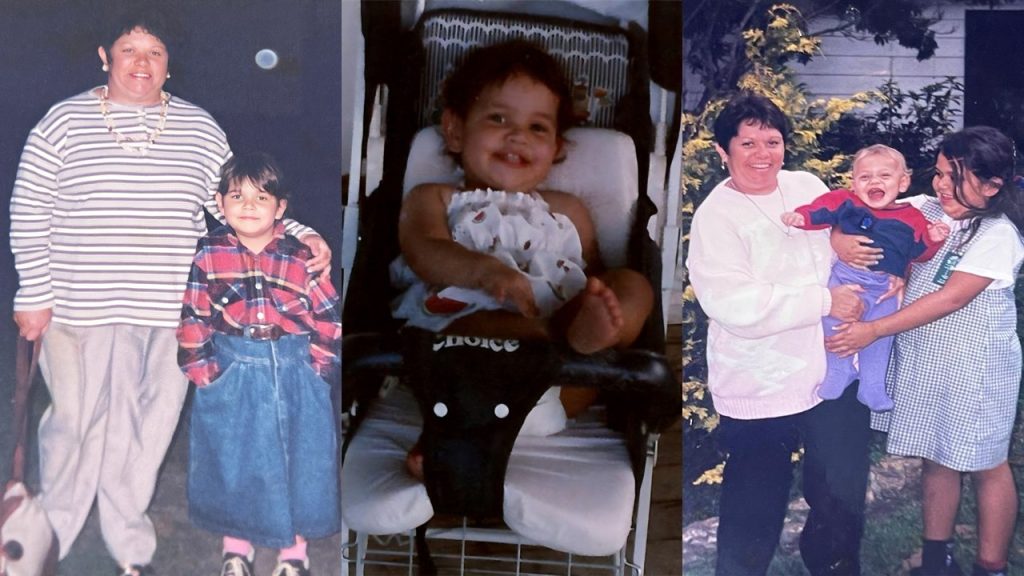
As IBA proudly recognises its 50th anniversary this year, another significant milestone stands alongside it, the 25th anniversary of Bawrunga Aboriginal Medical Service (BAMS). These shared anniversaries are more than numbers; they are a reflection of generations of resilience, partnership, and unwavering dedication to uplifting First Nations communities.
As one of the original founders, Weilwan woman Leavina Reid helped establish BAMS in 1999 to reduce the barriers Indigenous communities faced in accessing culturally appropriate GP clinic services. Leavina herself experienced firsthand the difficulty of accessing healthcare for her and her then 3-year-old daughter when they needed medical treatment.
At the local practice in the Nambucca Valley, the doctor asked Leavina, “Who do you want to be bulk billed, yourself or your daughter? I can only bulk bill one.” Without hesitation, she chose her child. She went without care that day, but the experience left her feeling humiliated and deeply hurt.
Mother’s love sparked a movement
That moment became a turning point. It pushed her to ensure no other Aboriginal person would be made to feel that way again and shamed in the same way. It was a mother’s love that sparked a movement, one that would grow into a legacy of care, dignity, and empowerment for generations to come.
Fast forward 25 years, and BAMS has transformed into one of the largest Aboriginal community-controlled social enterprises in NSW, operating multiple GP primary health clinics. Its journey is marked by groundbreaking achievements, including securing the Commonwealth Government tender in 2011 to build and operate the Coffs Harbour GP Super Clinic which has now been sold to a group of doctors, including a long-serving GP with deep ties to the clinic. This thoughtful transition ensures the clinic’s continued success and sustainability, while honouring the legacy of care established over the past decade.
Reflecting on this milestone, Leavina shares, “Our work is about more than just healthcare; it’s about making a difference in the lives of our people, ensuring they feel seen, heard, and cared for... Our journey is a powerful testament to what can be achieved when we work and move as one.”
Strategic expansion as 2nd chapter
This strategic move allows BAMS to focus on the 2nd chapter of its mission, BAMS Impact. This initiative expands beyond clinical care to address broader social determinants of health, including education, housing, and employment. With a foundation built on 25 years of expertise and deep community engagement, BAMS Impact is set to collaborate with key stakeholders with the aim of solving the various social issues faced by Indigenous communities, improving both clinical and social wellbeing thereby closing the gap in Indigenous health and wellbeing.
One of its first projects involves a partnership with a prominent Sydney law firm to provide pro bono culturally appropriate legal services at BAMS medical centres. Other initiatives in progress include establishing scholarship funds with the Australian Community Foundation and launching Indigenous Community Green Energy Projects to create sustainable job opportunities and strengthen rural infrastructure.
Supporters in progress
From humble beginnings to a thriving network of clinics, BAMS has become a beacon of Indigenous led healthcare innovation. Throughout this journey, IBA has supported them with business support and finance lending.
Deputy CEO, Sean Armistead, says: “Being part of BAMS’ journey has been a privilege. Their incredible growth and unwavering commitment to the health and wellbeing of First Nations communities are a testament to the strength of grassroots initiatives. We are proud to have walked alongside them.”
Throughout BAMS’ journey, many have played instrumental roles in its success. Leavina highlighted Dr. Larry Yee, whose support has been invaluable from the early days of the first Bowraville clinic in 1999 to the successful tender for the Coffs Harbour GP Super Clinic in 2011. His belief in BAMS’ mission and his contributions to its growth have helped shape its evolution.
As BAMS Impact prepares for its new journey, Dr. Yee shares his excitement “The timing is perfect, it’s as if the universe has aligned in our favour. BAMS Impact is poised to lead a transformative revolution in Indigenous healthcare, setting new standards for impact, success, and future potential.”
As IBA celebrates 5 decades of supporting First Nations businesses and communities, BAMS stands as a testament to the extraordinary achievements made possible by grassroots initiatives and strategic partnerships. Its journey from a single clinic to a network of thriving healthcare facilities embodies the power of determination and collaboration in turning aspirations into lasting legacies.
Leavina captures the essence of BAMS' story: “We’ve come so far because we believed in a vision larger than ourselves. And now, with BAMS Impact, we’re taking that vision to a whole new level.”
Rooted in the strength of the past and driven by the purpose of today, together IBA and BAMS are creating a future where every generation is empowered to live well, lead with confidence, and shape their own story.

Welcome to “The New Dreaming Podcast”, a powerful platform created to celebrate strength, success, and storytelling among Aboriginal and Torres Strait Islander men.
Born from a partnership between IBA and New Dream Productions, this special series holds space for truth-telling and real conversations that inspire, challenge, and empower. Each episode features First Nations men who are reshaping their futures, sharing journeys of resilience, leadership, and cultural pride in a space that honours their voices.
From stories of overcoming adversity to reflections on identity and purpose, the series invites listeners into conversations that are honest, uplifting, and deeply grounded in lived experience.
It’s a space where voices are heard, stories are honoured, and futures are imagined—together.
From his early days in Bowen dreaming by the shoreline to launching a coffee window beside his sister’s clinic, Josh’s journey is one of creativity, resilience, and purpose. Drawing on his background in Indigenous health and HR, he’s built a business that prioritises staff wellbeing and customer connection, challenging industry norms with professional practices and a family-first culture.
With plans to expand into deli-style offerings and a wine bar, Josh continues to grow his impact while staying true to his artistic roots in music. His story is a testament to trusting your instincts, building with intention, and creating spaces where people feel truly seen.
With no formal business training or entrepreneurial background, Jordan followed his instincts, diving into podcasts, audiobooks, and industry research to carve his own path. Support from IBA played a pivotal role, helping him turn ambition into action with practical guidance and funding.
Jordan speaks candidly about the realities of burnout and the importance of balance, offering hard-earned wisdom for anyone considering a leap into business. His story is a powerful reminder that trusting your gut and taking the first step can lead to a life of purpose and growth.
Raised in Logan as one of nine siblings, James draws strength from his Gunditjmara and Wiradjuri roots, which now shape the heart of his digital marketing business. After years of watching his cultural knowledge benefit others, he launched Barragi Mawang to empower Indigenous businesses with digital tools while staying true to community values.
With support from IBA, James has built a platform that blends business with storytelling—producing documentaries like Yurlu Country and writing about his uncle, the first Indigenous person commissioned in the Australian Army. His journey is a reminder that success doesn’t have to mean speeding up—it can mean slowing down to honour culture, connection, and authenticity.
In this candid episode, Adam explains how starting with social media before moving into e-commerce has helped First Nations businesses grow at the right pace. His story highlights the importance of relationships, especially with support organisations like IBA, and shows how real-world connections are just as vital as digital tools.
With new initiatives like the POS Cafe Shopify app and tailored programs for service-based businesses, Adam and his partner Carmel are creating meaningful change while staying grounded in culture and community.
Taunurung woman, Nicole, is a successful business and homeowner, with a lot to be proud of. But she takes the greatest pride in the values and financial independence that she inspires through generations of her family. 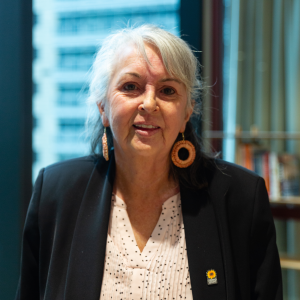
Nicole was determined from a young age to get on the property ladder early, to build her financial future. She achieved this at just 19 years old, through a loan with ATSIC (which later became IBA) and bought the ex-housing commission home that she’d grown up in.
“It was small, but over the years I made improvements to it,” Nicole said. “Funny thing is – I always understood the value of owning a home. I didn’t want to pay rent and waste money that could go into my own home.”
In time, Nicole transitioned to a mainstream lender and moved to another home. Fast-forward almost 40 years and one of Nicole’s three daughters, Georgia, has recently been approved for her first IBA home loan.
“I told Georgia about IBA and the value in saving to get her own place,” Nicole said. “I wanted her to have her own place too, not to waste money on rent.”
“It’s hard work and a lot of paperwork, but worth it. She’ll have her own home.”
“If Georgia had to go down a regular path, it’d be years before she had enough saved for a 20% deposit on a house. So, I kept saying to her, ‘make the enquiry at IBA’.”
Georgia and her partner, Mackenzie, have just found a home of their own with a backyard to share with their adored animals – she is the owner of three cats and wants to add to the brood with chickens and a dog.
“Sticking our sold sign onto the sale board was an amazing feeling!” Georgia said. 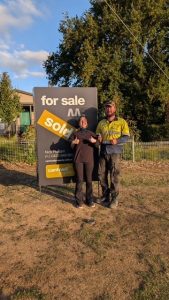
“I grew up with mum always having a home, and she inspired me to want the same.”
“I did rent for a while and it’s hard to save and have security when renting. I could see that the money I was paying in rent could be going into a place of my own.”
“So, I moved back to Mum’s for twelve months to squirrel my money into savings.”
While Georgia was looking for her home, Nicole was with her every step of the way and helping her go through building reports, paperwork and giving her advice on her home purchase.
“Mum has made me very aware of what I’m getting into!” Georgia laughed.
Nicole also owns and runs a successful business, Gerrbik Laundry Services. She bought it from her dad (then known as Complete Workwear Laundry Services) with an IBA business loan in 2015. We met her back then to yarn about her business journey: Poised for success - Indigenous Business Australia.
While Nicole’s business is flying now, she has faced huge challenges. Her core business is servicing the airline industry, and she says COVID-19 restrictions wiped out 95% of her business overnight. Nicole says that at times she thought she might lose her business, and her house (which had been used as collateral for the business). But managed to keep going and weather the storm.
"My connection with IBA has been a lifeline to me!" said Nicole. "They believed in me which has given me a lot more belief in myself."
Her hard work and tenacity paid off and the business revenue has since tripled from pre-Covid including a 7-year contract with an airline for their laundry service. Nicole credits the business success to her amazing team which includes three generations of family working with her, something that she is very proud of.
Georgia has also inherited her mum’s strong work ethic. She is a professional baker and part of a boutique artisan bakery, working early hours and long days. She’s not afraid of hard work.
Nicole’s impact through the generations doesn’t stop there. She’s also encouraging one of her other daughters to start preparing to apply for an IBA loan and saving for a deposit.
“It’s about sustaining yourselves through life.” Nicole said. “We need to be self-sustainable. I want to pass that on to my kids and grandkids.”
“My nine-year-old grandson already wants a house too,” she continued. “He even saved his birthday money. That’s exciting - knowing it’s passed down. That will be a legacy for our family.”
~~~~~~~~~~~~~~~~~~
Nicole spoke at IBA’s release of our latest impact report on 29 May on Gadigal Country. She discussed the generational impact of financial wellness. Check out IBA’s impact reports here: IBA Impact Report 2024 - Indigenous Business Australia
In October we celebrated the 10 year anniversary of Indigenous Business Month (IBM) which showcased the theme 'Making our Mark' where we shared, celebrated and congratulated First Nations businsesses making their mark in the business sector. On socials we shared our 'Feel Good Fridays' and customer stories that feautred First Nations businesses.
Below are some customers we shared for IBM as we feel the love and dedication of the Indigenous business sector.
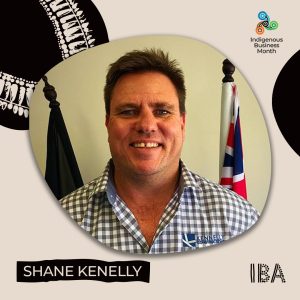 Meet Shane - Kennelly Constructions
Meet Shane - Kennelly Constructions
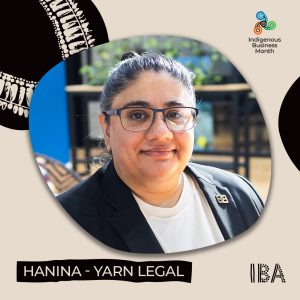
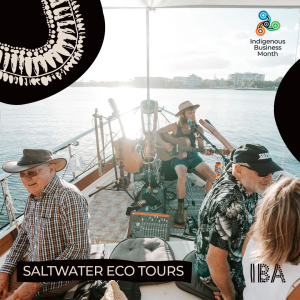
Meet Saltwater Eco Tours a unique tourism experience that would inspire a deeper connection to Indigenous culture and the ocean.

This awesome family business specialises in one-on-one digital support and e-commerce training for small and medium businesses who want to sell products online. They have also recently built an app specifically for Shopify Point of Sale called POS Cafe. The app allows businesses like cafes and coffee shops more flexibility to sell products that need complex modifications (like milk type or sweeteners).
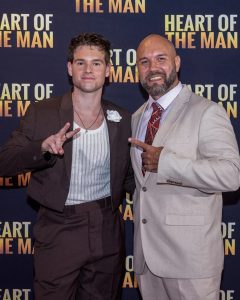
Meet David, making his mark in the film industry. His business @newdreamproductions has been shooting for the stars and making big moves.
His debut feature film, ‘Heart of the Man’, follows Chris Wundurra, an amateur boxer caught between family expectations and following his true passion. Currently making the festival rounds, with streaming platforms on the horizon!
David received a business loan from IBA which he used to purchase the equipment that produced this.
We also shared our newly launched Business Pathways report which highlighted the amazing work and milestones First Nations businesses are accomplishing. To read the more: IBA-Pathways-Business-Report.pdf
With a mission to create a more just and sustainable world through enterprise, Northern Territory based Together Business Australia Pty Ltd has made leap and bounds in supporting the financial literacy of mob all around Australia.
Founded in 2019 by Anaiwan woman, Sarah Hyland, Together Business is an Indigenous Chartered Accounting Firm which has set its path to making a difference for social enterprises that make change with their own communities.
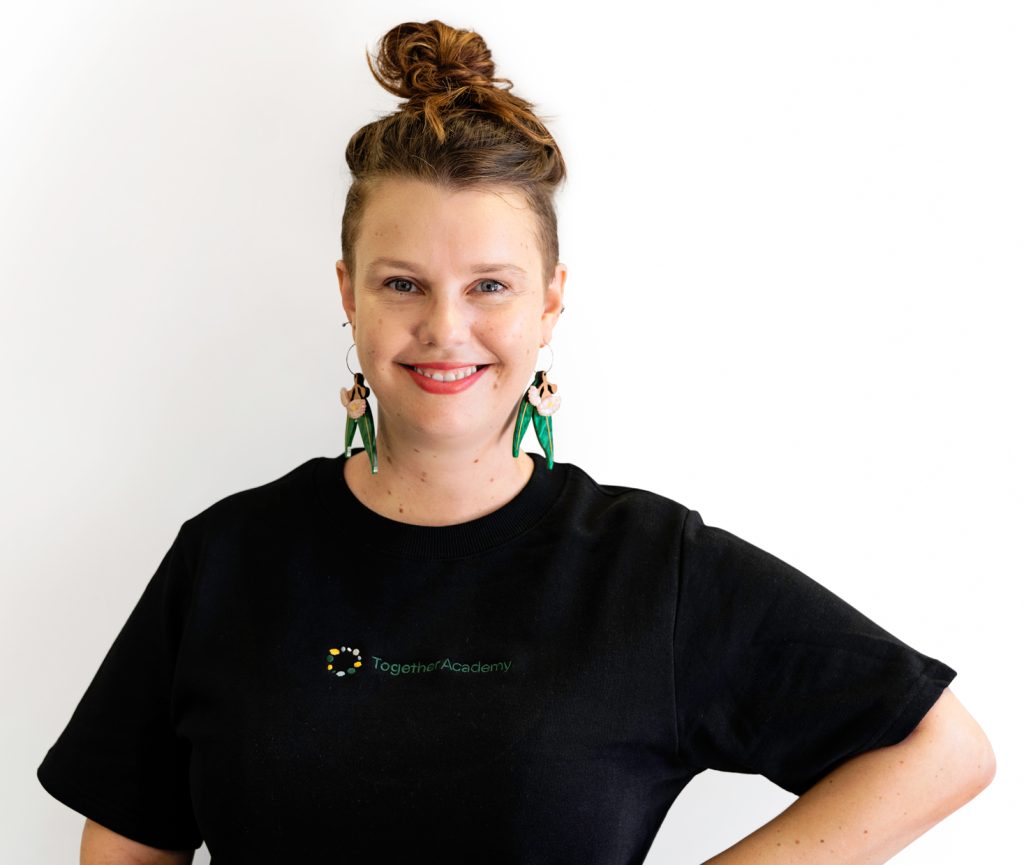
Under the Social Enterprise Grant, Sarah and her team have invested heavily in developing and delivering resources that support First Nations women with timely, affordable and fit-for-purpose financial and business advice. Sarah said that one of the key barriers to success for Indigenous business founders is not having a hands-on approach with a professional advisor, mainly due to affordability. Her brainchild ‘Together Academy’ is changing this through being a financial empowerment and education platform built on the Intellectual Property of Together Business. “It provides access to timely and fit-for-purpose accounting and business support to First Nations business founders, at all stages of business maturity,” Sarah said.
The program was delivered through a transformative platform that continues to empower Indigenous women and sistergirls with essential skills for sustainable business success. Through a meticulously curated series, participants gained knowledge to navigate the intricacies of entrepreneurship. Twelve modules of high-quality video content, cover topics that help establish and grow successful businesses.
Additionally, participants received mentoring support through a certified accountant, a weekly online forum and blogs. The Together Academy Business Financial Literacy Program has been delivered to 77 First Nations women of which 61% identified as start-ups, while 22% classified themselves as scale-ups, signalling aspirations for business growth and expansion.
Sarah said that despite challenges inherent in modern business life, the program has garnered significant interest and yielded invaluable insights for future improvements.
“Our primary objective throughout this series was to empower Indigenous women and Sistergirls in business by enhancing their financial literacy skills,” Sarah said. “We were over the moon when our evaluation showed that a remarkable 75% of women reported a noticeable improvement in their knowledge and financial confidence as a direct consequence of their participation. That made all the hard work worthwhile,” Sarah said.
Throughout the program development and launch, the twelve video resources received 324 views with additional engagement covering a workbook, 100 blog articles, a business directory page and a funding opportunities wall.
Together Academy Ltd has now been established as a standalone not for profit, holding charitable status. "The Purpose of Together Academy is to be the go-to source of credible, and reliable business knowledge for diverse founders.
We're celebrating the incredible journey of Karl and Ash, the dedicated owners of Impact Panel & Paint.
"If I look back from where we started to where we are now, it’s a massive achievement. From renting to purchasing our own property and building," says Karl.
Their story is a testament to resilience and growth, evolving from humble beginnings into a thriving family business. Not only have they excelled in their industry, but they have also made a lasting impression on us.
Since 2011, we’ve had the honour of witnessing their remarkable growth, both in business and in their personal lives. From being a dynamic duo to becoming a beautiful family of five, we’ve been privileged to capture their inspiring journey.
We’re excited to share their story with you. Watch below.
In the heart of the Northern Territory, a powerful movement has been started by social enterprise Wave of Change Consultancy Pty Ltd. Woolwonga and Kukatj woman, raised on Larrakia and Yolngu land, Lateesha Jeffrey, stands at the forefront, with firsthand experience and knowledge about the devastating impact of lateral violence on Aboriginal and Torres Strait Islander people and communities. But instead of succumbing to despair, she chose to create a beacon of hope: the ‘Lateral Empowerment’ program.
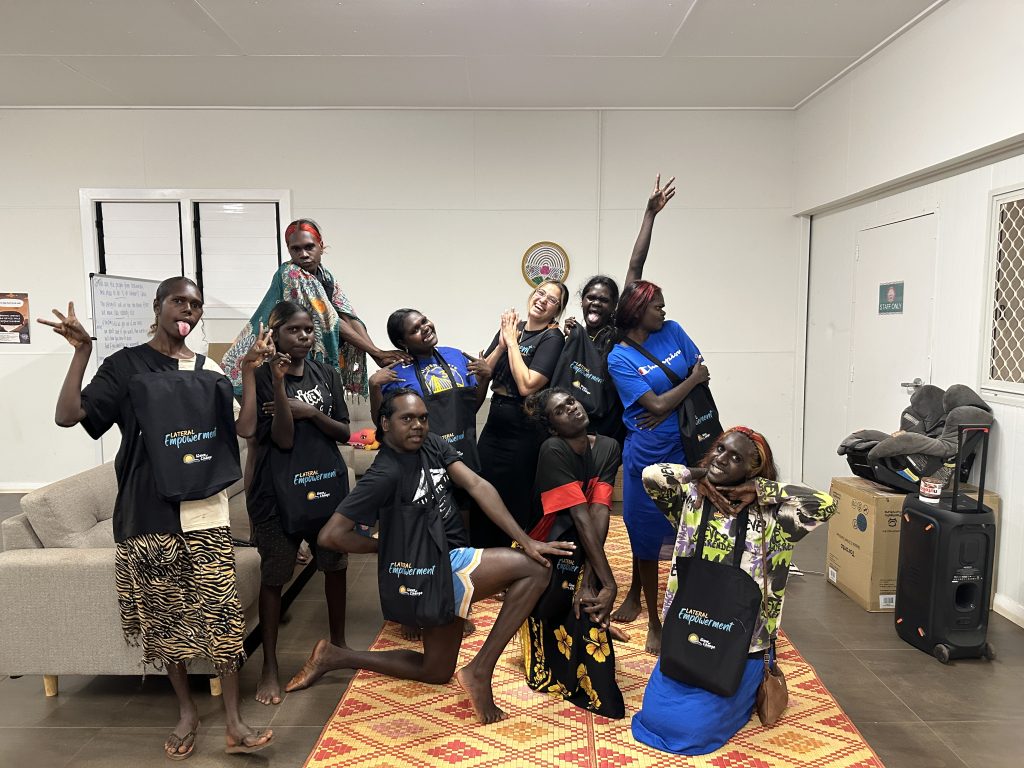
Together with staunch First Nations women Jaylene Chevalier and Rhiannon Busch, the program has been designed and delivered by Indigenous women, for Indigenous women. Championed by founder Lateesha Jeffrey, Wave of Change Consultancy rolled out the ‘Lateral Empowerment’ program – designed to dismantle lateral violence with the goal to give Aboriginal and Torres Strait Islander women and girls reflective tools to cut through the dark sides of lateral violence and inspire and uplift one another. From Tennant Creek, and Groote Eylandt to Galiwin’ku with many other Territory communities in between, Lateesha and her team were able to successfully work with 187 women and girls from 14 different remote and very remote locations.
The lateral violence that is explored through the program relates to the harmful behaviours that Aboriginal and Torres Strait Islander people are both subjected to and/ or have perpetuated. Lateral violence has devastating effects that can cause the deepening of intergenerational trauma, with the behaviours occurring within families, in schools, organisations and communities at large.
With her experience in leadership on the sports field as well as soft skills developed working within education and government, Lateesha was well-positioned to deliver a transformative program with a unique approach.
“Our emotionally and trauma-informed practices encourage participants to not only understand their experiences of lateral violence but also identify where they may have perpetuated these behaviours in their own life,” Lateesha says. “Participants are provided the safe space to practice reflection, whilst also empowering responsibility and accountability towards changing the negative narrative, instilling principles of lateral empowerment for future generations.”
The program delivery has underpinned Wave of Change’s theory of change, being that the reflective nature of the program enables participants to be accountable for their actions and identify an opportunity to promote a strength-based approach through ‘lateral empowerment’.
“The power of this program,” Lateesha says, “is that by capturing what makes the participants feel safe to connect, share and learn, we created a ripple effect because the women understood how to support and uplift others within their community to eventually stop lateral violence altogether.”
The success of the program is evident as 95.6% of participants completed the workshops with a greater understanding of lateral violence and the impacts.
A participant remarked that the tears during the program showed the authenticity of how lateral violence is happening for these ladies in their communities each day and how the chains of silence have been broken: “The empowerment to these ladies to find their voice and speak up through the program demonstrated the strength gathered through sharing their stories with everyone”, the participant stated.
The Lateral Empowerment Program continues to be delivered within the Northern Territory at a fee for service (due to lack of ongoing funding), with hopes to expand interstate to continue the powerful movement with First Nations women and girls.
Wave of Change were a Social Enterprise partner with IBA in 2003.
I was born in Ayr, North Queensland and grew up on a sugar cane farm on Bindal and Juru country. My family are mainly of Scottish and Swiss German heritage. Since I grew up on a farm on either side of a large creek/lagoon (big enough for waterskiing), I always loved being outdoors especially near the water. Like many farmers of the region, my father was a keen fisherman, so many weekends and holidays were spent either on the water or near it, both fresh and salt water. I love music, and I love to travel. My current travel fixation is Yaegl country of northern New South Wales. Very much like where I grew up. Lots of water, fishing; and of course, sugar cane. 
Nowadays I reside in Brisbane on Turrbal and Yuggera Country, where I live with my husband Vernon, and my two beautiful daughters, Lara and Sasha. I also can’t forget our Jack Russell Foxies Eddie and Frankie, and the ruler of the house our cat Manola.
I currently work as Manager, Compliance and Process Improvement. The role involves improving compliance outcomes for mandatory processes and finding efficiencies in how we deliver our products and services to our business finance customers. Prior to this, my role was supporting the process of customer repayments and defaults.
After high school I attended James Cook University in Townsville and completed a Bachelor of Commerce. I then accepted an entry-level position at Australian Government Solicitor. I assisted with matters relating to the housing and business lending programs for ATSIC, amongst other paralegal responsibilities for various government departments and agencies, including the ATO, the Child Support Agency, Centrelink, Department of Defence, and the ACCC.
Once ATSIC was dissolved, several Australian Government Solicitor staff transitioned to IBA to assist the housing and business programs. I was invited to have a chat with IBA through a colleague and later applied for a role. That was over 17 years ago, and I’ve never looked back. I cannot believe it has been this long!
I have always had a strong sense of justice and equality. What we aspire to achieve at IBA aligns with my values. Growing up, I was always intrigued by ancient cultures and especially admire, the strength, courage and resilience of Aboriginal and Torres Strait Islander people.
I want to make a difference for the better, and IBA provides an opportunity to do that. It’s great to work where everyone collectively shares your hopes for a better future.
Frasier is a show I have watched religiously; it’s definitely one of my favourite shows. It’s witty, funny and I just love the comedic timing. If there was a quiz or trivia based on Frasier, I would definitely be giving everyone a run for their money.
IBA CEO Kirsty Moore and Chair Eddie Fry spoke with Australian Institute of Company Directors on how IBA is working toward the economic empowerment of First Nations communities. The resulting article describes IBA's 'powerful activities' which has transformed the dream of home ownership into reality, for 21,000 owner-occupier Indigenous families and individuals.
See full article below, which appeared on the AICD website.
Home ownership. For many First Nations Australians, it’s a dream which will only ever remain out of reach and a remote fantasy. But for 21,000 owner-occupier Indigenous families and individuals, it’s an idea which has at last actually transformed into reality, due to powerful activities by federal agency Indigenous Business Australia (IBA).
Roughly, we are nearing 5,000 home loans nationally at this point in time,” IBA CEO Kirsty Moore GAICD told the AICD in a recent interview in Perth. “And we continue to have very, very strong demand.
“The Indigenous home ownership program is the longest running program in the Indigenous affairs portfolio and it's been around for almost 50 years.”
According to the 2021 census, only 41 per cent of First Nations people own their own homes, compared to 66 per cent of non-First Nations people. “So there's a gap,” says Moore. It's a real gap in home ownership. For as long as that gap exists, IBA will need to play a role in in providing that finance where the mainstream banks won't.
“The need for that finance isn't just the fact that our customers live in maybe regional and remote areas where banks do not lend… but it's also because they don't have the bank of Mum and Dad. They don't have that intergenerational asset to support them. And they don't necessarily have role models in their community to look at - people who've owned a property.”

IBA also finances First Nations businesses. These range from small businesses such as Kakadu Kitchen, a non-alcoholic drinks entity with a store in Humpty Doo, and Mack Construction NT, a design and construction service, through to bigger enterprises such as the Centre for Appropriate Technology in Alice Springs, Warialda Engineering and Welding based in NSW, and Wilpena Pound Resort in the Flinders Ranges in South Australia.
IBA has also invested in building a new cucumber farm in Geraldton, Western Australia, and greenhouses are currently being constructed, according to Moore. “It’s part of a native title settlement with the state of Western Australia and we have had some extensive investment into that. The intent is that it will become Australia's largest cucumber farm.”
IBA is working with First Nations organisations across Australia and has joined forces with Export Finance Australia to empower First Nations companies to build their capacity to enter international markets.
IBA has an investment pipeline manages a portfolio of co-investments with Indigenous organisations valued at over $500 million, including direct investments, managed funds and a real estate investment trust. According to the IBA 2023-2024 Corporate Plan, IBA currently has $2 billion in net assets, which it aims to grow to $2.5 billion by 2028.
IBA Chair Eddie Fry, a Dagoman-Wardaman man from the Katherine region in the Northern Territory, told the AICD that IBA has already doubled net assets from $1.15 billion in 2014 to around $2 billion now. “We have cleaned up a lot of non-performing assets and we also have a board that clearly understands the commercial marketplace,” he said.
“We got smarter at doing business. In 2017, we made a massive leap from about 450 home loans to about over 900 in that one year.”
Management culture has also changed both at board level and at the operational level and offices such as the ACT have been downsized. “I would suggest we've taken on a greater corporate and operational approach than we used to have.”
The future
Over the next five years, IBA will facilitate new investment opportunities and new partnership arrangements to increase wealth and assets. It has boosted this work through recent partnership activity with the Northern Australian Infrastructure Facility (NAIF), Housing Australia, and Export Finance Australia (EFA), and in strategic banking partnerships with Australian Unity and Bank Australia.
According to the 2021 national census, there are now nearly one million First Nations people in Australia. The population of Aboriginal and Torres Strait Islander people now sits at around 984,000.
However, high interest rates and high property prices are making home ownership a more difficult proposition for many First Nations people.
“I think a big challenge going forward is to see how IBA can exceed what market conditions are currently determining. In the previous two years, house prices have just skyrocketed. Therefore, that’s going to impact on the ability of our buyers to borrow,” says Fry.
Because first homebuyers are struggling to find properties to purchase, IBA launched in August a shared equity program, which combines a finance option with an IBA home loan. The borrowing capacity of customers is increased, so they do not need to buy smaller properties than they need. “They still borrow the same amount, but by IBA putting in an equity contribution, the customer can hopefully buy a more appropriate home in a better location, with proximity to amenity and family, community in particular,” says Moore.
She says the focus on regional areas is important. Over 60 per cent of the home loan book of IBA is in regional Australia, mostly Queensland and NSW, she says. About 10 per cent is in remote areas, mainly in the Northern Territory and Western Australia.
“That's where the IBA business investment activity comes in, because we believe that if we can create local economic development, that will create opportunities for people ultimately to take control of their own futures.
“We know that home ownership provides security. A roof over your head. We also know this concept of passing assets onto kids really resonates strongly with our customer base, who want to give their kids a bright future. So they want to own a home, and they want to pass on the home. They want those kids to know that they can lay their roots in that place.”
She says IBA is governed by federal legislation and is obliged to make sustainable investment decisions to ensure that when lending to customers, the risks of ultimate financial losses are minimised through good customer support and sensible lending decisions in the first place.
“It is the IBA support which is the bit that creates success,” says Moore. “So it's the support around readiness to enter into that financial commitment in the first place. And making sure that if somebody is going to buy a house, they really understand the obligations of home ownership, that they really understand what it will mean and how they're going to withstand certain pitfalls that might come – that they have financial literacy. We support them through the customer journey for the entire length of the loan.”
UK-born Moore became CEO of IBA in May 2021, after starting as IBA Head of Products and Markets in early 2018. Driven by a passion to help people who need support, she has lived experience of difficulty with home ownership and brings this understanding to her role.
“I think part of my motivation is the fact that I come from disadvantage myself. My family come from a social housing background in the UK and I understand about opportunity. So, for me, I really want to support a cohort of society that needs assistance. It’s really as simple as that.”
Role of the board
The IBA board is composed of majority First Nations members alongside non-Indigenous members – all with business expertise. “Our board understands our customer base, so they understand some of the challenges that sit in community, they understand some of the issues of intergenerational trauma and they understand the concept of a proper fair go,” says Moore.
“They don't want IBA to be purely giving handouts. They want IBA to be investing with people who are ready to actually have a bit of gumption and go forward and take control of their own economic future.”
The board is also heavily focussed on cyber security and in 2021 created an IT subcommittee. “This is a new thing that we put in place a couple years ago in response to the need to make sure technology starts at the board level.
It recognises that we do need to have modern day banking systems, and appropriate data protection in place,” she says.
The board has also driven and monitored a significant digital transformation to update IT and core business systems. “We went from having quite old-fashioned IT systems to being on the cusp of having a modern-day banking system that is used by mainstream financial services institutions. The board has supported the organisation to do that and played an active role in the oversight of that initiative.”
The board is very engaged on the subject of cyber security, inquisitive and keen to understand it, she says. “They're definitely not passive when it comes to technology and implications of cyber and customer protection in general.
“Remember that we are here not only to deal with very sensitive information pertaining to the most disadvantaged but there's also a reputational risk to the Commonwealth government, if we get it wrong.”
Feeling fresh? So are Yamatji Enterprises Limited (YEL), 4 Ways Fresh Produce and IBA. The parties have formed a joint venture company to establish a cucumber farm in Geraldton, Western Australia, creating a legacy for traditional owners.
The company, Yamatji Fresh Produce Pty Ltd, will develop 400 greenhouses to grow cucumbers making it the largest grower in Australia. It will also consider growing other crops such as tomatoes, eggplants and capsicum to fill the national supply gap. The joint venture will provide job opportunities for the community – creating a lasting legacy for generations to come.
In 2022, Yamatji and IBA acquired two adjacent parcels of land in Geraldton WA. Construction of a horticultural facility began in 2023. The first 125 greenhouses are expected to be completed in 2024 and another 125 greenhouses will follow in 2025.
One of the major highlights of last fiscal year was achieving development approval. Navigating through the regulatory landscape was no small feat, but we secured the green light to move ahead with the project. This milestone has paved the way for us to turn our vision into reality, and we cannot wait to see the transformation of the land into a flourishing cucumber haven.
Another significant achievement was the completion of the fencing work around the block. Not only was the completion of the fencing work a significant milestone in our project’s development, but it also represented a crucial achievement in our commitment to First Nations procurement. It marked the first of many First Nations–led contracts we are expecting to secure and deliver.
In addition, groundwork officially commenced with the construction of the dam, which will be the lifeblood of the facility, providing a reliable and efficient irrigation system to support the growth of our cucumber crops. As we dug the foundations, we knew that we were digging the foundations of a brighter future for the Yamatji community. We also initiated the construction of other essential facilities, including the ablution block, an integral part of the working environment for our future employees.
With the first 125 greenhouses under construction, we can already visualise the thriving fields of cucumbers awaiting us in the upcoming harvest. Once built, the facility will be able to produce roughly 1,700 t of cucumbers per annum.
